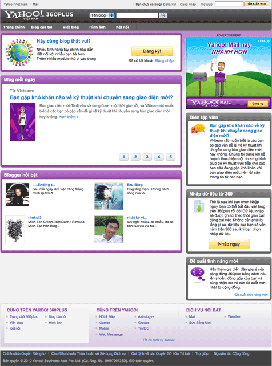Related Research Articles

A blog is an informational website consisting of discrete, often informal diary-style text entries (posts). Posts are typically displayed in reverse chronological order so that the most recent post appears first, at the top of the web page. In the 2000s, blogs were often the work of a single individual, occasionally of a small group, and often covered a single subject or topic. In the 2010s, "multi-author blogs" (MABs) emerged, featuring the writing of multiple authors and sometimes professionally edited. MABs from newspapers, other media outlets, universities, think tanks, advocacy groups, and similar institutions account for an increasing quantity of blog traffic. The rise of Twitter and other "microblogging" systems helps integrate MABs and single-author blogs into the news media. Blog can also be used as a verb, meaning to maintain or add content to a blog.
LiveJournal, stylised as LiVEJOURNAL, is a Russian-owned social networking service where users can keep a blog, journal, or diary. American programmer Brad Fitzpatrick started LiveJournal on April 15, 1999, as a way of keeping his high school friends updated on his activities. In January 2005, American blogging software company Six Apart purchased Danga Interactive, the company that operated LiveJournal, from Fitzpatrick.

Delicious was a social bookmarking web service for storing, sharing, and discovering web bookmarks. The site was founded by Joshua Schachter and Peter Gadjokov in 2003 and acquired by Yahoo! in 2005. By the end of 2008, the service claimed more than 5.3 million users and 180 million unique bookmarked URLs. Yahoo sold Delicious to AVOS Systems in April 2011, and the site relaunched in a "back to beta" state on September 27 that year. In May 2014, AVOS sold the site to Science Inc. In January 2016 Delicious Media, a new alliance, reported it had assumed control of the service.

Flickr is an image hosting and video hosting service, as well as an online community, founded in Canada and headquartered in the United States. It was created by Ludicorp in 2004 and was previously a common way for amateur and professional photographers to host high-resolution photos. It has changed ownership several times and has been owned by SmugMug since April 20, 2018.

Yahoo! 360° was a social networking and personal communication portal operated by Yahoo! made available in 2005. It enabled users to create personal web sites, share photos from Yahoo! Photos, maintain blogs and lists, create and share a public profile and see which friends are currently online. 360° also featured a 'friends updates' section, under which each friend's latest update was summarized. This service was never officially launched; Yahoo! prematurely stopped developing this service in 2008.
BuzzNet is a photo, journal, and video-sharing social media network that is currently owned by Hive Media. The network was owned by SpinMedia from its inception until September 2016, when it was sold to Hive Media.
Weblogs, Inc. was a blog network that published content on a variety of subjects, including tech news, video games, automobiles, and pop culture. At one point, the network had as many as 90 blogs, although the vast majority of its traffic could be attributed to a smaller number of breakout titles, as was typical of most large-scale successful blog networks of the mid-2000s. Popular blogs included Engadget, Autoblog, TUAW, Joystiq, Luxist, Slashfood, Cinematical, TV Squad, Download Squad, Blogging Baby, Gadling, AdJab, and Blogging Stocks.

Panoramio was a geo-located tagging, photo sharing mashup active between 2005 and 2016. Photos uploaded to the site were accessible as a layer in Google Earth and Google Maps. The site's goal was to allow Google Earth users to learn more about a given area by viewing the photos that other users had taken at that location. Panoramio was acquired by Google in 2007. In 2009 the website was among the 1000 most popular websites worldwide.
PopSugar Inc. is an American media and technology company that is the parent to the media property PopSugar and a monthly subscription business PopSugar Must Have. The company was founded in 2006 by married couple Brian and Lisa Sugar as a pop culture blog. The company is part of American digital holding company Vox Media.

Shelfari was a social cataloging website. Shelfari users built virtual bookshelves of the titles they owned or had read, and could rate, review, tag, and discuss their books. Users could also create groups that other members could join, create discussions, and talk about books, or other topics. Recommendations could be sent to friends on the site for what books to read.

BlogHer is an American media company founded by Elisa Camahort Page, Jory des Jardins, and Lisa Stone in 2005. It is an online blogger community and holds a yearly conference for women bloggers. BlogHer is owned by SHE Media which is a division of Penske Media Corporation.
Hype Machine is a music blog aggregator created by Anthony Volodkin.

Tumblr is a microblogging and social networking website founded by David Karp in 2007 and currently owned by American company Automattic. The service allows users to post multimedia and other content to a short-form blog.
Aardvark was a social search service that connected users live with friends or friends-of-friends who were able to answer their questions, also known as a knowledge market. Users submitted questions via the Aardvark website, email or instant messenger and Aardvark identified and facilitated a live chat or email conversation with one or more topic experts in the 'askers' extended social network. Aardvark was used for asking subjective questions for which human judgment or recommendation was desired. It was also used extensively for technical support questions. Users could also review question and answer history and other settings on the Aardvark website. Google acquired Aardvark for $50 million on February 11, 2010. In September 2011, Google announced it would discontinue a number of its products, including Aardvark.

Quora is a social question-and-answer website and online knowledge market headquartered in Mountain View, California. It was founded on June 25, 2009, and made available to the public on June 21, 2010. Users can collaborate by editing questions and commenting on answers that have been submitted by other users. As of 2020, the website was visited by 300 million users a month.
Disqus is an American blog comment hosting service for websites and online communities that use a networked platform. The company's platform includes various features, such as social integration, social networking, user profiles, spam and moderation tools, analytics, email notifications, and mobile commenting. It was founded in 2007 by Daniel Ha and Jason Yan as a Y Combinator startup.

Google+ was a social network that was owned and operated by Google until it ceased operations in 2019. The network was launched on June 28, 2011, in an attempt to challenge other social networks, linking other Google products like Google Drive, Blogger and YouTube. The service, Google's fourth foray into social networking, experienced strong growth in its initial years, although usage statistics varied, depending on how the service was defined. Three Google executives oversaw the service, which underwent substantial changes that led to a redesign in November 2015.

Pinterest is an American social media service for publishing and discovery of information in the form of pinboards. This includes recipes, home, style, motivation, and inspiration on the Internet using image sharing. Pinterest, Inc. was founded by Ben Silbermann, Paul Sciarra, and Evan Sharp, and is headquartered in San Francisco.

A like button, like option, or recommend button is a feature in communication software such as social networking services, Internet forums, news websites and blogs where the user can express that they like, enjoy or support certain content. Internet services that feature like buttons usually display the number of users who liked the content, and may show a full or partial list of them. This is a quantitative alternative to other methods of expressing reaction to content, like writing a reply text. Some websites also include a dislike button, so the user can either vote in favor, against or neutrally. Other websites include more complex web content voting systems; for example, five stars or reaction buttons to show a wider range of emotion to the content.
References
- ↑ Djuraskovic, Ogi (October 4, 2023). "8 Types of Blogs and Bloggers. What Type is Yours?". FirstSiteGuide. 5. Reverse blogs. Retrieved 5 April 2024.
- ↑ "Quora Has The Magic: Benchmark Invests at $86 Million Valuation TechCrunch;". TechCrunch.com. 29 March 2010. Retrieved 2011-12-05.